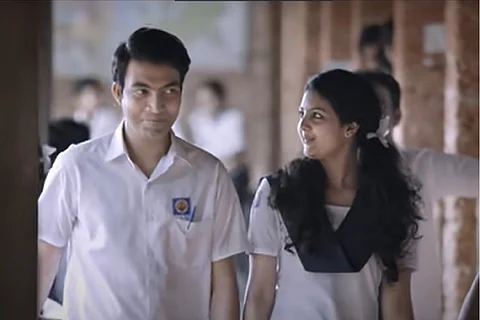

It is an unusually long car ride for Krishnan and his daughter (Joju George and Anaswara Rajan) in the newly released film, Aviyal. So long that the daughter gets to hear (and actually wants to, unlike typical teenagers) the whole story of her father's youth, with some debatable conclusions. The posters had prominently featured Joju and Anaswara — one known for his versatility and the other for pulling off young characters adorably well. But they turn out to be narrators, rather, one narrator and the other listener, of a story about love, rebellion, and being young. The bulk of the acting falls on Sirajudeen Nazir, who very convincingly plays several different stages of a boy growing into a man in Krishnan's story. The film, while novel and appreciable in parts, has a lot to patch up by way of storytelling, performances and knowing when to pause the music.
Shanil Muhammed, writer and director of the film, comes up with an interesting technique for Krishnan to tell his tale. What if, like you hear in many old stories, moments of life flash by you when you have a near-death experience? Would you then have glimpses of a life gone by, think of once forgotten names and faces from the past, and then share it all with the teenage daughter with you? You would, if you are Krishnakumar, a very relaxed dad who takes the news of his daughter drinking beer and being broken hearted by a boy with a smile, and has no qualms about letting her know it's nothing compared to what he had done in his youth.
Sirajudeen enters the picture as an innocent schoolboy, playing young Krishnakumar, very close to his father and discovering love. This part of the story, perhaps because it is placed in the early 1990s or thereabouts, is made like a film in those days — following movements of the girls and boys, the sudden burst of a song, the admiration in the boy's eye and the indifference to it all in the girl's. But you have to give it to the young actors — they all do remarkably well. The dad does too — he is introduced along with young Krishnan, as the friendly parent giving tips to the boy on how he should first be friends with the girl he likes. Much like Krishnan does with his daughter years later. Inheritance, you gather.
Watch: Trailer of the film
It might have gone on a straightforward trajectory, the past seamlessly gelling into the future. But the journey becomes chaotic, and the calmness of the 1990s disappears slowly. Not that it was desirable as a plot device, but had it been done well, it might have worked better to merge the times. By the time he leaves school and becomes a college student, Krishnan is no longer the nice guy waiting for his father with food. Symbolically, you had seen the beginning of this change at an early stage, when, dejected, he moves to the back bench in his class — which, in the film, has very negative connotations.
Shanil uses the guitar as a tool, one that goes with Krishnan from one stage of his life to another, first as a way to please, then as a way to exploit, finally as a means of earning an income. Krishnan becomes the wayward youngster, and comes to unpredictable endings. Stories of several women get told — actors Anjali Nair, Ketaki Narayanan and Athmiya Rajan all walking in and out of the screen, playing important women in his life, each making their presence felt. However, some performances, like Athmiya’s, fall rather flat.
All through it, Sirajudeen is wonderful with even the littlest of gestures, the way his eyes move quickly and lecherously when he sees a married woman, the way he throws around Kannur Malayalam so smoothly, the way he can turn from a very feeling man to being full of indifference. The script appears to become abstract, jerking from scene to scene — Krishnan putting his face under water or letting flashes of angry, passionate moments pass by — as his life goes haywire. The camera goes everywhere, sometimes appearing to fall to the ground — experiments in filmmaking, perhaps, accompanying the confusion.
The 'disciplined' ‘90s script disappears to give space for a disorderly abstract, perhaps in tune with the chaos of Krishnan's life. However, it doesn't flow, as it is meant to; the disruptions are not a smooth fit. Though some of the music is enjoyable, it becomes an annoying or unnecessary accompaniment at times.
What began as a novel storytelling also loses ground, bringing to mind several films of the past that told stories of youth and love in stages. The conversations between dad and daughter often sound staged, and towards the end, preachy. Nevertheless, the effort is appreciable. Trying to tread a different route is not always easy.
Disclaimer: This review was not paid for or commissioned by anyone associated with the series/film. TNM Editorial is independent of any business relationship the organisation may have with producers or any other members of its cast or crew.